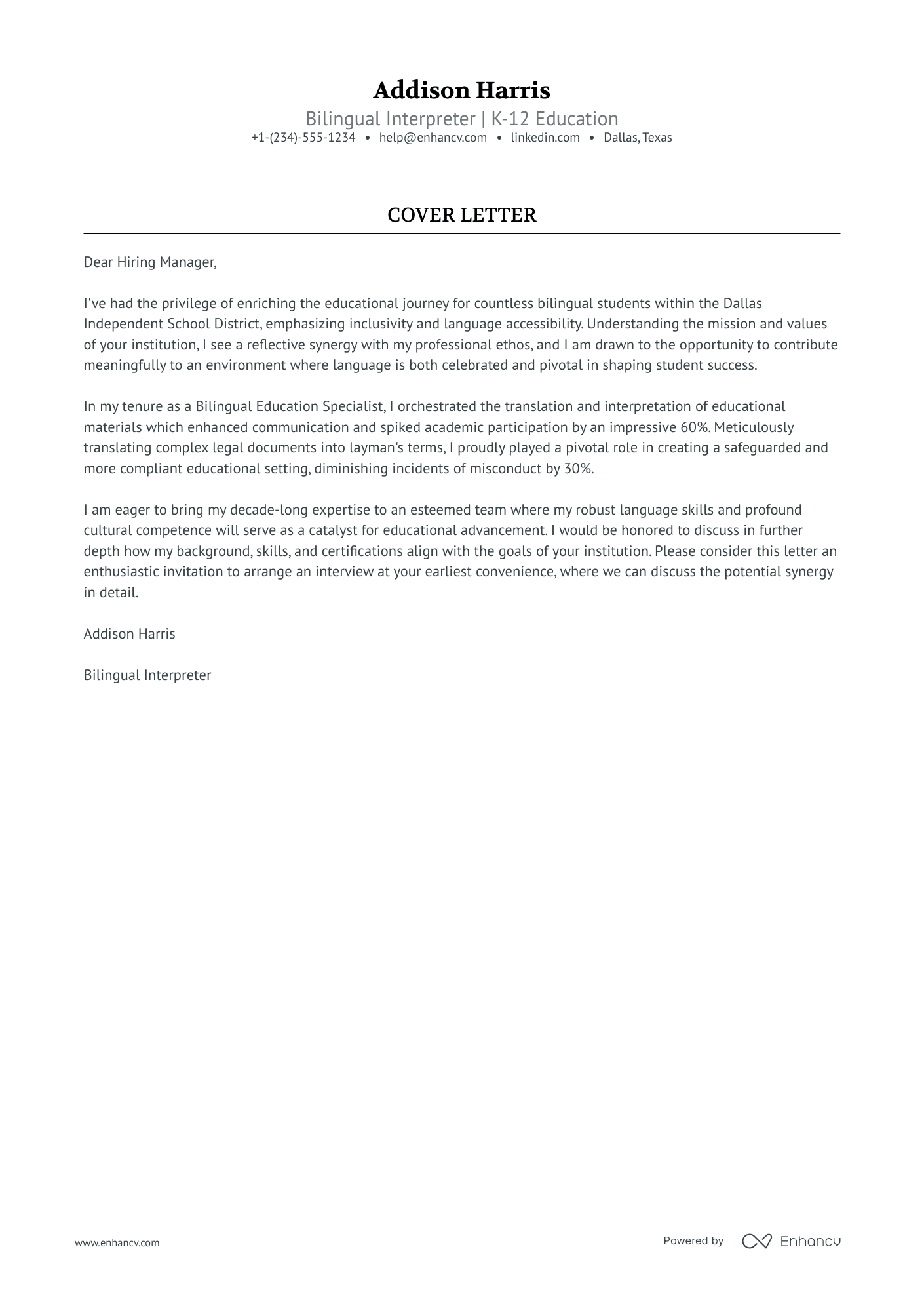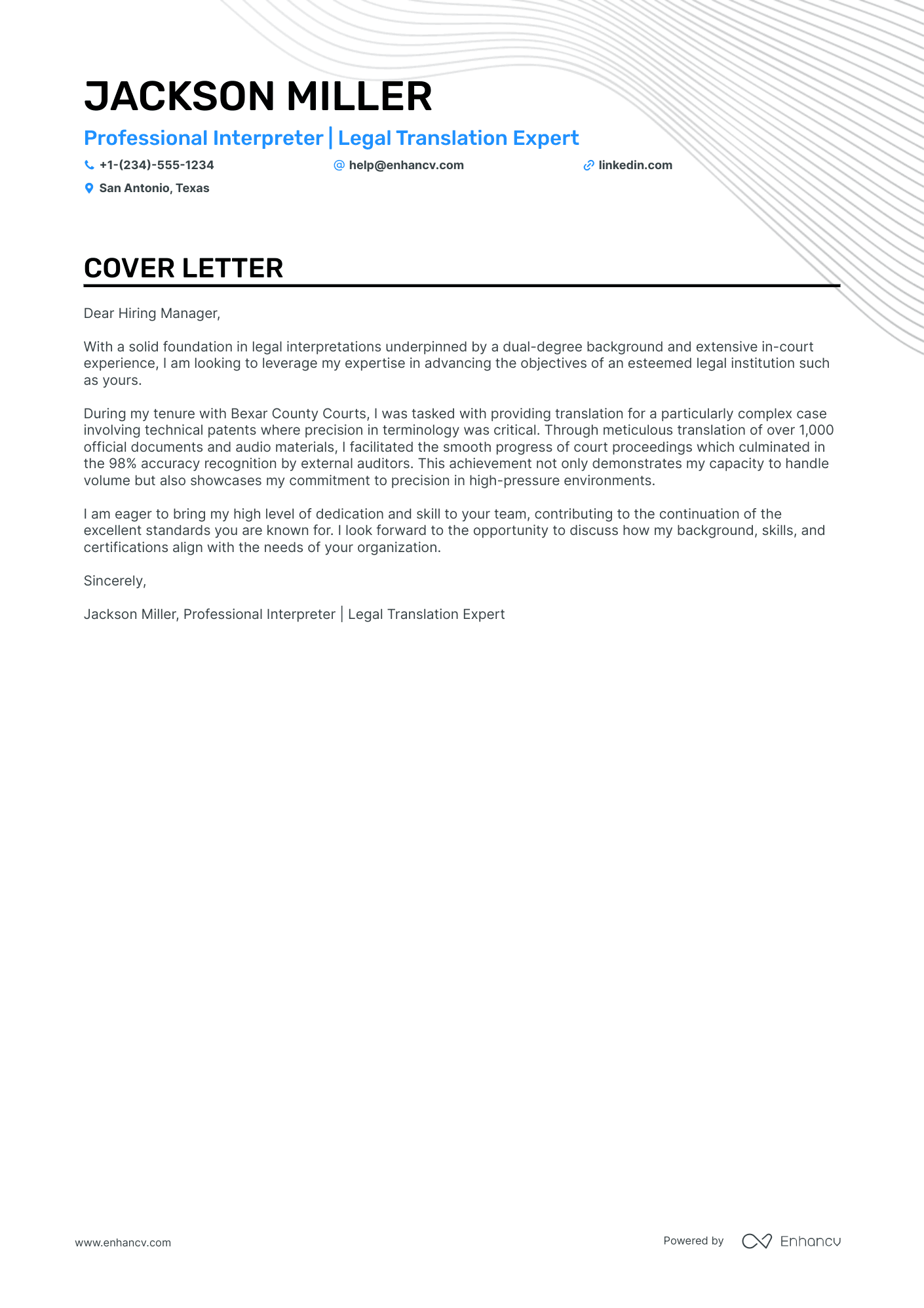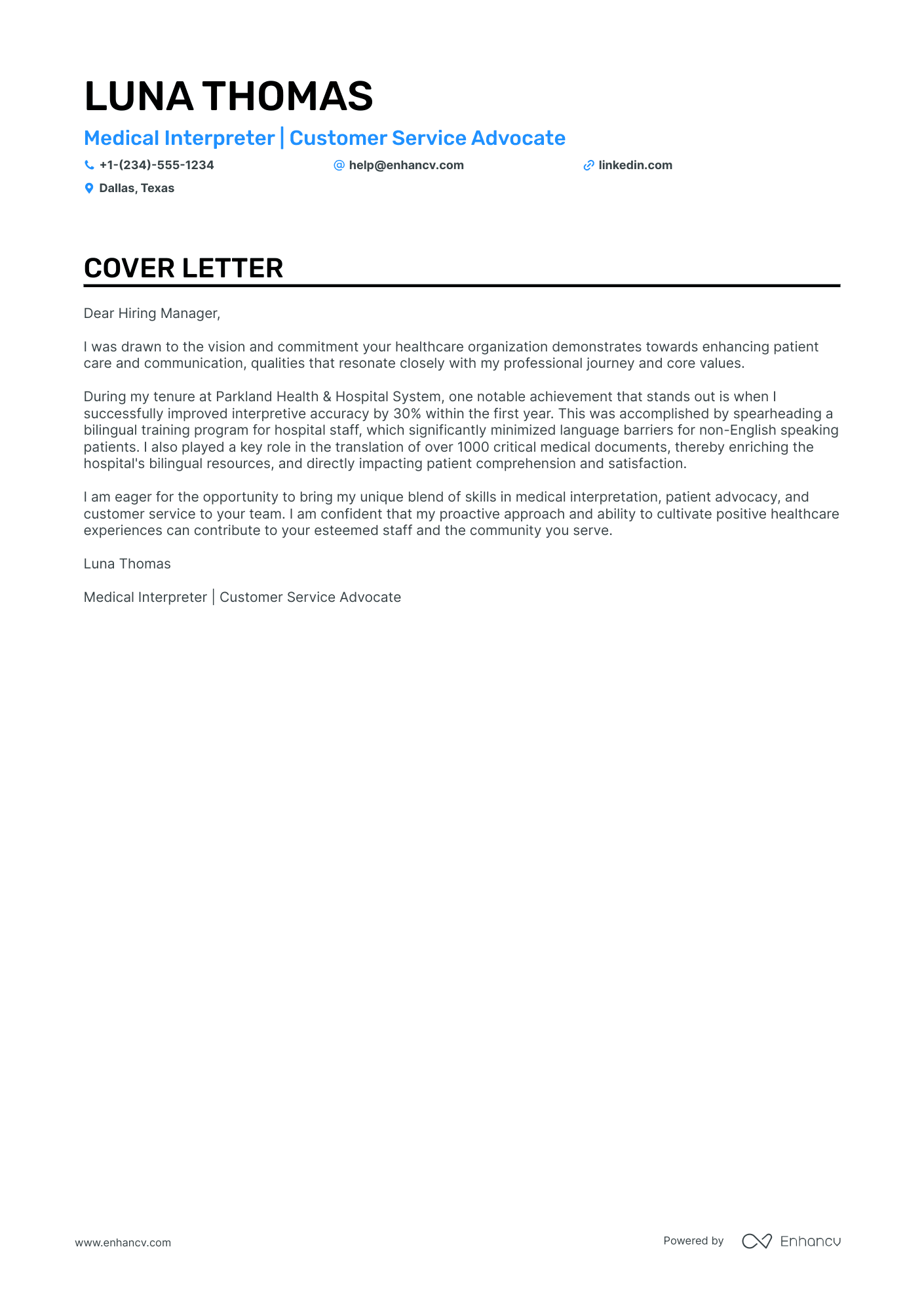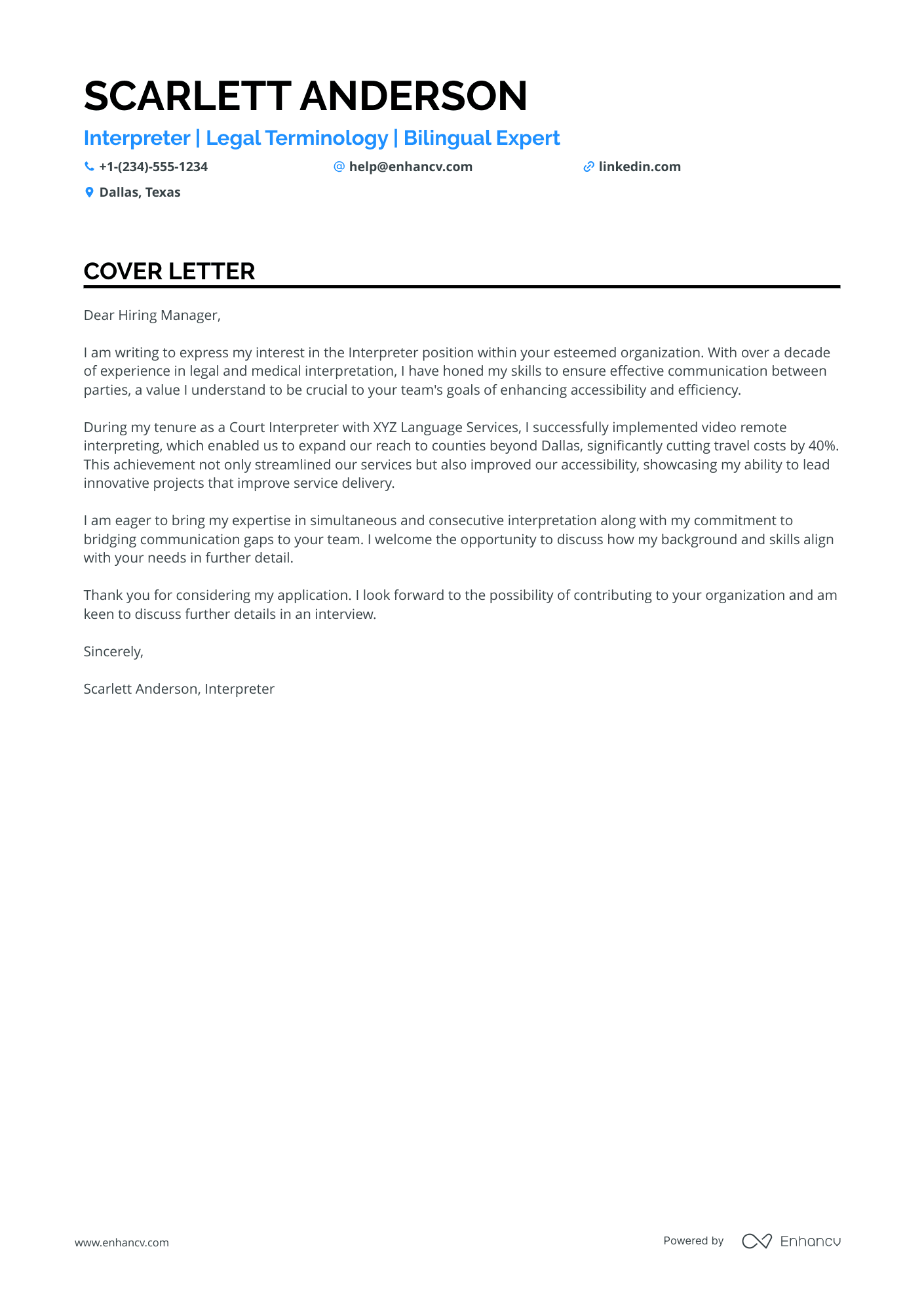Crafting an interpreter cover letter can be a tricky endeavor. You're keen to land that dream role, and you've noticed that a compelling cover letter is part of the application puzzle. It must rise above your resume without echoing it, telling a unique and powerful story of your proudest achievement. Striking a balance between formal tone and originality, while keeping it concise - no more than one page - can be challenging. Here's how to navigate these hurdles with ease.
- Personalize the greeting to address the recruiter and your introduction that fits the role;
- Follow good examples for individual roles and industries from job-winning cover letters;
- Decide on your most noteworthy achievement to stand out;
- Format, download, and submit your interpreter cover letter, following the best HR practices.
Use the power of Enhancv's AI: drag and drop your interpreter resume, which will swiftly be converted into your job-winning cover letter.
If the interpreter isn't exactly the one you're looking for we have a plethora of cover letter examples for jobs like this one:
Drop your resume here or choose a file.
PDF & DOCX only. Max 2MB file size.
Interpreter cover letter example
Jackson Miller
San Diego, California
+1-(234)-555-1234
help@enhancv.com
- Emphasis on direct impact in previous roles, such as implementing a digital interpretation system, which demonstrates the candidate's potential for innovation and process improvement within the healthcare facility.
- Highlighting of specific achievements, like the 50% reduction in patient wait times, to showcase the candidate's ability to deliver measurable results that can enhance patient experience and operational efficiency.
- Expression of alignment with the organization's values, such as a shared commitment to patient care, which helps to create a personal connection with the hiring manager and shows cultural fit for the team.
The visual appeal of your interpreter cover letter: format, font, and structure
When using our cover letter builder, make sure to include these vital sections:
- Header (with your name, contact details, the role, and date);
- Greeting (that's personalized to the recruiter);
- Introductory paragraph (to capture attention);
- Body paragraph (to tell a story of how you've obtained your job-crucial skills);
- Closing paragraph (ending with a nod to the future ahead);
- Signature (that is not a must).
Our cover letter templates are already set up for you with the best interpreter cover letter design with single-spaced paragraphs and a one-inch margin.
As for the font of your interpreter cover letter, use the same one as you did in your resume (where modern and simple fonts, like Rubik and Bitter, take precedence over Arial and Times New Roman).
Your interpreter cover letter is created with the recruiters in mind - as no Applicant Tracker System looks over this part of your profile.
When sending over your interpreter cover letter, download it in PDF. This format allows your information and design to stay intact and to keep the same visual quality.
Why worry about your cover letter? Create one instantly using our free cover letter generator.
The top sections on a interpreter cover letter
- Header: This includes your contact information, date, and the employer's contact information, ensuring the letter is professional and easy to reference.
- Greeting: Tailor this section with the hiring manager’s name to show attentiveness to detail, a crucial trait for an interpreter.
- Introduction: Briefly mention your language proficiency and interpreting experience to immediately establish your relevance to the role.
- Body: Here, delve into specific interpreting assignments you've completed and any relevant certifications, demonstrating your expertise and readiness for the position.
- Closing: Express your enthusiasm for the opportunity to contribute your interpreting skills to the organization and include a call to action, such as an invitation for an interview.
Key qualities recruiters search for in a candidate’s cover letter
- Proficiency in the required languages: Demonstrates the ability to accurately interpret between the source and target languages.
- Cultural competency: Understanding the customs and nuances of the cultures associated with the languages to provide contextually appropriate interpretation.
- Strong listening and speaking skills: Essential for accurately capturing spoken words and conveying the exact meaning, tone, and intent.
- Experience in the interpreting field or a related area: Shows a history of successful interpretation in similar settings (e.g., medical, legal, conference) and ability to handle the job's specific demands.
- Certification in interpretation: Indicates professional training and adherence to industry standards, which is often mandatory for certain types of interpreting jobs.
- Discretion and adherence to ethical standards: Ensures client confidentiality and unbiased interpretation, which is critical in sensitive situations such as legal or medical settings.
Greeting recruiters with your interpreter cover letter salutation
What better way to start your conversation with the hiring manager, than by greeting them?
Take the time to find out who the professional, recruiting for the role, is.
Search on LinkedIn, the company website. And for those still keen on making a fantastic first impression, you could even contact the organization, asking for the recruiter's name and more details about the job.
Address recruiters in the interpreter greeting by either their first name or last name. (e.g. "Dear Anthony" or "Dear Ms. Smarts").
If you're unable to discover the recruiter's name - don't go for the impersonal "To whom it may concern", but instead use "Dear HR team".
List of salutations you can use
- Dear Hiring Manager,
- Dear [Company Name] Recruiting Team,
- Dear [Department Name] Hiring Committee,
- Dear [Mr./Mrs./Ms./Dr.] [Last Name],
- Dear Talent Acquisition Team,
- Esteemed Colleagues,
Get creative with your interpreter cover letter introduction
Recruiters are going to assess plenty of candidate profiles for the role. Thus, anything you do to stand out will win you brownie points.
Use your interpreter cover letter introduction to share something memorable about your experience.
But before you go down the rabbit hole of creativity and humor, align your message with the company culture.
For example, if you are applying for a role in some startup, use those first two sentences to tell a funny story (about your experience) to quickly connect with the recruiter.
What to write in the body of your interpreter cover letter
Now that you've got your intro covered, here comes the heart and soul of your interpreter cover letter.
It's time to write the middle or body paragraphs. This is the space where you talk about your relevant talent in terms of hard skills (or technologies) and soft (or people and communication) skills.
Keep in mind that the cover letter has a different purpose from your interpreter resume.
Yes, you still have to be able to show recruiters what makes your experience unique (and applicable) to the role.
But, instead of just listing skills, aim to tell a story of your one, greatest accomplishment.
Select your achievement that:
- covers job-crucial skills;
- can be measured with tangible metrics;
- shows you in the best light.
Use the next three to six paragraphs to detail what this success has taught you, and also to sell your profile.
Ending your interpreter cover letter to avoid "sincerely yours"
Yes, this sort of closing statement may work best before your signature.
But you want to give recruiters something more with your interpreter cover letter ending.
Some professionals choose to go down the path of promises. In a single sentence, they map out what they'd bring about to the role (whether that's a particular technical skill set or personal traits).
Others, decide to be more concrete by thanking recruiters for their time and prompting for their next interview.
Whatever path you choose, remember to always be polite and respectful of the opportunity you've had. Good manners go a long way.
What could you write about in your interpreter cover letter when you have no experience
Candidates with zero professional experience often struggle to write their interpreter cover letter.
You may lack experience, but your application could still be impressive when you focus on your strengths.
Consider your most relevant talents (and/or one achievement) that align with the role and help you stand out.
Perhaps you spent every summer volunteering at your local dog pound - think of the job-relevant skills this experience taught you.
Sharing your tangible career goals is another good strategy to stand out.
Key takeaways
We hope this interpreter cover letter writing guide has shown you how to:
- Format your interpreter cover letter with the mandatory sections (e.g. header, greeting, intro, body, and closing) and select the right font (P.S. It should be the same as the one you've used for your resume);
- Substitute your lack of professional experience with your most noteworthy achievement, outside of work, or your dreams and passions;
- Ensure recruiters have a more personalized experience by tailoring your cover letter not just to the role, but to them (e.g. writing their first/last name in the salutation, etc.);
- Introducing your biggest achievement and the skills it has taught you in your interpreter cover letter body;
- Write no more than two sentences in your interpreter cover letter introduction to set the right tone from the get-go.
Interpreter cover letter examples
By Role
Bilingual Interpreter
Court Interpreter
Spanish Interpreter
Legal Interpreter
- Showcasing Relevant Experience: The applicant highlights over a decade of experience in legal and medical interpretation, demonstrating extensive knowledge and expertise crucial for the role.
- Innovation and Impact: By mentioning the implementation of video remote interpreting, the candidate illustrates their ability to lead projects that enhance service delivery, which could appeal to employers seeking efficiency improvements.
- Specific Achievements: Quantifying success with the 40% reduction in travel costs provides concrete evidence of the applicant's contributions and value to previous employers, making their candidacy stand out.
- Alignment with Company Goals: The cover letter emphasizes how the candidate's skills and experiences align with the organization's objectives of enhancing accessibility and efficiency, indicating thorough research and genuine interest in the position.













